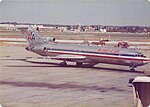2000 ASA Pesada Antonov An-24 crash

The 2000 ASA Pesada Antonov An-24 crash occurred on 15 November 2000 when an Antonov An-24 registered as D2-FCG operated by Angolan airliner ASA Pesada crashed shortly after taking off from Quatro de Fevereiro Airport in Angola's capital Luanda. The aircraft was carrying 52 passengers and 5 crewmembers and was heading to Yuri Gagarin Airport in Namibe Province, Angola. All 57 people on board were killed in the crash. The crash was the third deadliest plane crash in Angola, the second deadliest plane crash involving an Antonov An-24 and the second plane crash to occur in the country in just less than 3 weeks. On 31 October, another Antonov An-24 carrying 49 people operated by ACA-Ancargo Air crashed on the northern part of the country, killing all 49 people on board with UNITA rebels claimed to have shot down the plane.
Excerpt from the Wikipedia article 2000 ASA Pesada Antonov An-24 crash (License: CC BY-SA 3.0, Authors, Images).2000 ASA Pesada Antonov An-24 crash
Luanda Samba Urban District
Geographical coordinates (GPS) Address Nearby Places Show on map
Geographical coordinates (GPS)
| Latitude | Longitude |
|---|---|
| N -8.8938888888889 ° | E 13.215277777778 ° |
Address
Luanda, Samba Urban District
Luanda Province, Angola
Open on Google Maps






